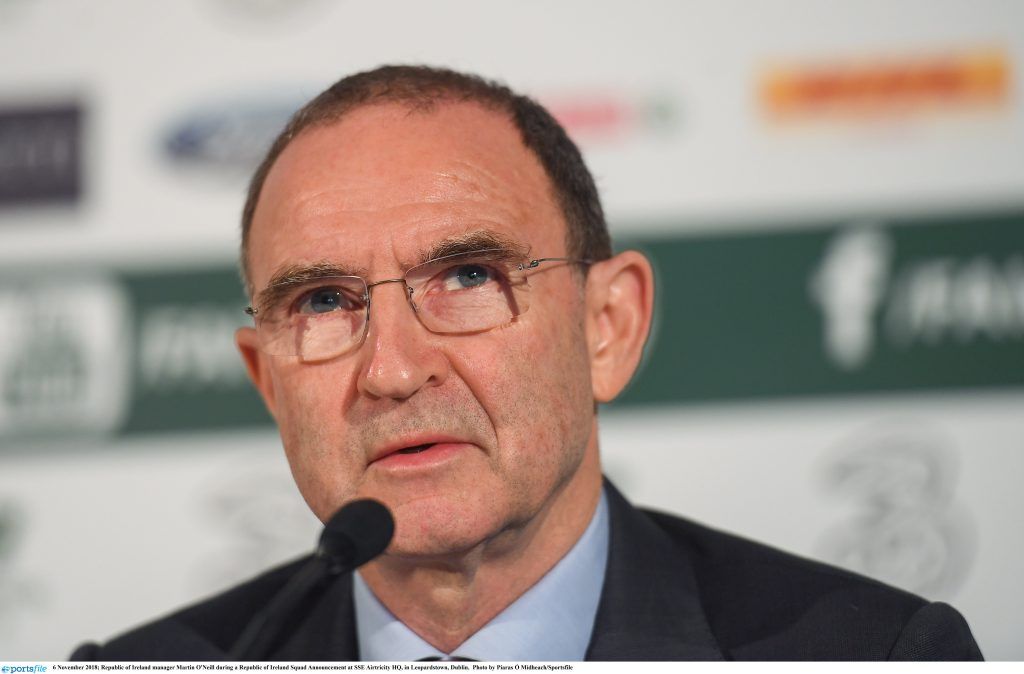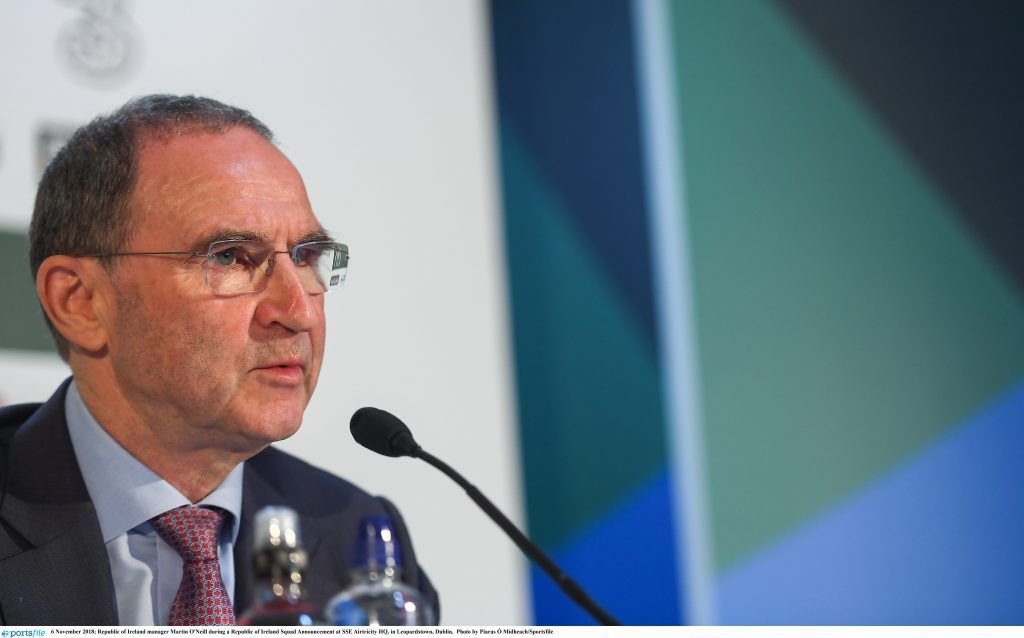

Share
7th November 2018
11:30am GMT

 However, he then gave an insight into his outlook and why Ireland will continue to flounder under the current management team, regardless of the players available to him.
"Young Burke, was the first one in I don't know how many years that actually participated and scored a goal. On the strength of that, he got a move to Preston. Now it’s up to him," O'Neill said.
The "it's up to him" remark sums up O'Neill. He places the emphasis wholly on the players. As far as he is concerned, it is up to them to prove their talent.
When he names his team an hour before the kick-off, it is up to the players to figure out where what position they are playing in. When he throws on three strikers near the end of a match, it is up to the players to make sense of it.
It is up to the players, not the manager, to win games. This view is why the team are going no-where under him. This is how he views football. This approach has been long bypassed.
https://twitter.com/RobRedmond10/status/1052540692000595969
"I'm not an agent for all of these players. My job is to be impressed by players at the end of it all. Some players have gone over to England and for one reason or another have not come through," he continued.
However, he then gave an insight into his outlook and why Ireland will continue to flounder under the current management team, regardless of the players available to him.
"Young Burke, was the first one in I don't know how many years that actually participated and scored a goal. On the strength of that, he got a move to Preston. Now it’s up to him," O'Neill said.
The "it's up to him" remark sums up O'Neill. He places the emphasis wholly on the players. As far as he is concerned, it is up to them to prove their talent.
When he names his team an hour before the kick-off, it is up to the players to figure out where what position they are playing in. When he throws on three strikers near the end of a match, it is up to the players to make sense of it.
It is up to the players, not the manager, to win games. This view is why the team are going no-where under him. This is how he views football. This approach has been long bypassed.
https://twitter.com/RobRedmond10/status/1052540692000595969
"I'm not an agent for all of these players. My job is to be impressed by players at the end of it all. Some players have gone over to England and for one reason or another have not come through," he continued.
"It’s not that they haven’t come through to the Premier League, they haven’t come through at some of the lower levels. So then you have to ask the question, what is it? When somebody goes over early and comes back quickly, it’s not the perfect recipe for international football and trying to win games."These comments show how O'Neill's outlook is entirely framed by English football. He is judging players based on the clubs they feature for, rather than their ability and suitability for the national team. Would it not be a better approach to judge a player based on how they can help the national team by fitting into a tactical plan that will get the better of the opposition? It would, but there is no evidence of any tactical plan with the Ireland team. They have been a shambles at set-pieces since O'Neill was appointed and have shown no sign of improvement. There is no discernible pattern of play. There is no defensive structure. The players look confused and lost. Do they work on set-pieces or team shape in training? Do they work on a plan to stop the opposition? Almost certainly not. https://twitter.com/SportsJOEdotie/status/1049722754285690882 Instead, you have a manager building his team based on the club each player is employed by. This type of thinking - an overreliance on English football and an adherence to the merits of English football as a whole - has held Irish football back and is now utterly redundant. If we are to base our opinions of players solely on the clubs they play for in England, then Irish football is about to be consigned to the wilderness. Because the chances of a young Irish player breaking into a Premier League team is now extremely remote. Over 30 years ago, when Irish players featured for the biggest clubs in England, it was maybe possible to take this approach. In 2018, it is hopelessly out of date. The national team needs a coach, someone who can make the most of the players available to him. O'Neill is also basing his team selection on the work of others. He is effectively saying that he picks his team according to external factors. That a player isn't good enough for Ireland until the moment that another manager decides he is good enough for his team in the Premier League and the Championship. What type of way is this to select a team?
 The Ireland manager spoke about Patrick McEleney, the Dundalk midfielder who has been one of the best players in Ireland over the past couple of years. He had a brief spell with Oldham in League One earlier this year, but returned to Dundalk.
His manager Stephen Kenny rightly pointed out that it is unfair to judge McEleney unfavourably because it didn't work out with Oldham, The conditions and style of football between that team and Dundalk are vastly different. Kenny also urged Irish football to look beyond English football and to look at what our players can do, rather than focusing on their shortcomings.
Meanwhile, O'Neill is still framed by British football logic from the 1970s and 80s.
"It’s nice to see him (McEleney) doing well. He's got a bit of something. But you have to step up and that’s a case with a lot of players here," he said.
The "step-up" remark is another puzzling comment. Would it really be a step-up for McEleney to go from the passing, progressive football of Dundalk, where the players know their roles and the team are coached, to the turgid, blob of nothingness that is Ireland under the current management team?
It would be a step-up in terms of the players McEleney would play with and against, but that's it.
https://twitter.com/SportsJOEdotie/status/1038411384546058240
"If your career is playing at the highest level, the highest level is the Premier League, La Liga, the Bundesliga or Serie A. Some players still have a lot of work to do," he continued.
The Ireland manager spoke about Patrick McEleney, the Dundalk midfielder who has been one of the best players in Ireland over the past couple of years. He had a brief spell with Oldham in League One earlier this year, but returned to Dundalk.
His manager Stephen Kenny rightly pointed out that it is unfair to judge McEleney unfavourably because it didn't work out with Oldham, The conditions and style of football between that team and Dundalk are vastly different. Kenny also urged Irish football to look beyond English football and to look at what our players can do, rather than focusing on their shortcomings.
Meanwhile, O'Neill is still framed by British football logic from the 1970s and 80s.
"It’s nice to see him (McEleney) doing well. He's got a bit of something. But you have to step up and that’s a case with a lot of players here," he said.
The "step-up" remark is another puzzling comment. Would it really be a step-up for McEleney to go from the passing, progressive football of Dundalk, where the players know their roles and the team are coached, to the turgid, blob of nothingness that is Ireland under the current management team?
It would be a step-up in terms of the players McEleney would play with and against, but that's it.
https://twitter.com/SportsJOEdotie/status/1038411384546058240
"If your career is playing at the highest level, the highest level is the Premier League, La Liga, the Bundesliga or Serie A. Some players still have a lot of work to do," he continued.
"Just because somebody does alright in some game, doesn’t mean they're an international player."O'Neill selected Cyrus Christie, a full-back, to play in central midfield in two competitive games. It could be argued that his opinion of what makes "an international player" is questionable. Contrast O'Neill's comments with those of Kenny in recent weeks and it is clear who should be the Ireland manager. Kenny has a positive view of Irish footballers and works to bring out their best qualities. https://twitter.com/SportsJOEdotie/status/1059203385621131266 O'Neill speaks like a pundit on British TV talking about the Irish team, basing his opinion of players according to the club they feature for, rather than their ability and how they can fit into a tactical plan. Irish football desperately needs to move past this fatalistic and bankrupt approach. https://twitter.com/RTEsoccer/status/1059776391619756032
Explore more on these topics: